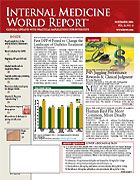Publication
Article
Internal Medicine World Report
Higher Endogenous Sex Hormones Lower CV Risk in Men
Author(s):
Older men with higher serum levels of the sex hormone estradiol are at much lower risk for a cardiovascular (CV) event, according to the results of a new study published in the Annals of Internal Medicine (2006; 145:176-184).
While it had been postulated that endogenous sex hormones—testosterone, dehydroepiandrosterone (DHEA), and estradiol—have an effect on CV risk, previous studies reported conflicting results.
This 10-year, community-based, prospective study included 2084 middle-aged white men who did not have CV disease (CVD) when the study began. Multivariable Cox regression was used to determine whether baseline levels of testosterone, DHEA, and estradiol were related to the occurrence of a CV event, including coronary, cerebrovascular, or peripheral vascular disease, or heart failure.
During the follow-up period, a total of 386 (18.5%) men had a first CV event. After adjusting for standard CV risk factors at baseline, higher estradiol levels correlated with lower risk for a CV event (P = .035).
Multivariate analysis showed that men in the highest quartile of estradiol levels were at a 33% lower risk for a CV event than men in the lowest quartile.
Effect modification was observed by age, with increased estradiol levels reducing CV risk in older (mean age, >56 years; P = .005), but not in younger men (mean age, ≤56 years; P = .36). The strong association between higher estradiol levels and reduced number of CV events persisted in time-dependent Cox models.
Lead investigator Johan Ärnlöv, MD, PhD, of the National Heart, Lung, and Blood Institute’s Framingham Heart Study, National Institutes of Health, and colleagues listed 3 possible mechanisms underlying this inverse correlation between estradiol levels and CV risk:
• The positive effects of estrogen on CV risk factors, such as blood pressure, lipid levels, and blood glucose
• The positive effects of estrogen on nontraditional CV risk factors, such as homocysteine levels, hemostatic factors, inflammation, endothelial function
• Increased estradiol levels may diminish susceptibility to ischemia-induced damage in target organs.
“We observed that a higher serum estradiol level was associated with a lower risk for CVD events after adjustment for established cardiovascular risk factors,” the investigators write. “Our findings are consistent with the hypothesis that endogenous estrogen has vasculoprotective influences in men.”
The study is limited because measurement of sex hormones only occurred at study onset. In addition, the makeup of the study population (ie, white men only) makes it difficult to generalize the findings to women or to other racial groups.






